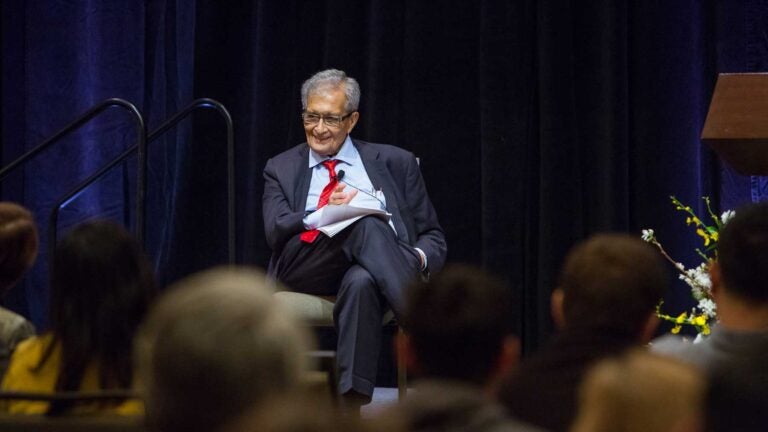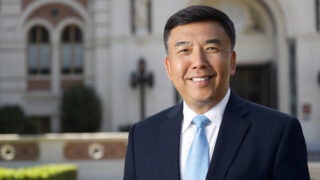
Harvard University professor of economics and philosophy Amartya Sen (Photo/Brian Morri)
Nobel Prize winner argues for academic freedom in higher education
Delivering this year’s Pullias Lecture, famed Harvard professor Amartya Sen advocates for university autonomy
In 1633, Galileo Galilei was brought before the Inquisition, found guilty of heresy and sentenced to house arrest for the rest of his life.
In opposition to the Catholic Church, Galileo had famously advocated for the idea that Earth revolved around the sun. But could the University of Padua, where Galileo had worked for years, do anything to help him?
Amartya Sen, a professor of philosophy and economics at Harvard University, used that historical anecdote as a framework for thinking about academic freedom in the modern world as he delivered the 39th annual Pullias Lecture at USC.
Hosted by the USC Rossier School of Education’s Pullias Center for Higher Education, the event is the oldest endowed lecture series on higher education in the country.
Sen used this year’s speech to deliver a strong critique of the government of India, his native country.
The stifling of academic freedom has been, I think, the biggest factor behind why we don’t have a single top university in India.
Amartya Sen
“The stifling of academic freedom has been, I think, the biggest factor behind why we don’t have a single top university in India,” Sen said.
Poverty and famine
Sen grew up seeing poverty and inequity on terrifying display during the Bengal famine of 1943, in which millions of people perished. His experiences as a youth would become a major influence on his later work as a fierce advocate for the poor and dispossessed. His research on welfare economics earned him the Nobel Prize in Economics in 1998.
“If there is one word that defines the intellectual brilliance of Amartya Sen, it would be this: freedom,” said USC President C. L. Max Nikias, introducing Sen as the “conscience of economics.”
While Sen noted that universities in all countries have to watch for authoritarianism, his speech focused most on oversight in India. Not only has a long history of state authoritarianism harmed universities there, Sen argued, but the denial of autonomy to those universities has reinforced authoritarianism within the state.
Among the problems Sen cited: using control of public funding as a bludgeon; prioritizing programs of study that suit political priorities; the encroachment of religion; the appointment of party favorites to roles as chancellors and administrators; and funding given to works of anti-intellectualism.
While asked by an audience member to compare India’s intellectual climate to that of the United States, Sen demurred, stating that the two countries are too different and that the problems faced by higher education in India are of more immediate danger.
But Sen did note that in any country, the responsibility for protecting academic freedom rests with the people affected and with the general public.
“The need to defend academic broadmindedness by resisting political narrow-mindedness would be hard to exaggerate in India today,” Sen said. “The future of India will matter a great deal on how India is able to confront these transgressions that imperil academic freedom and indeed, much else.”



